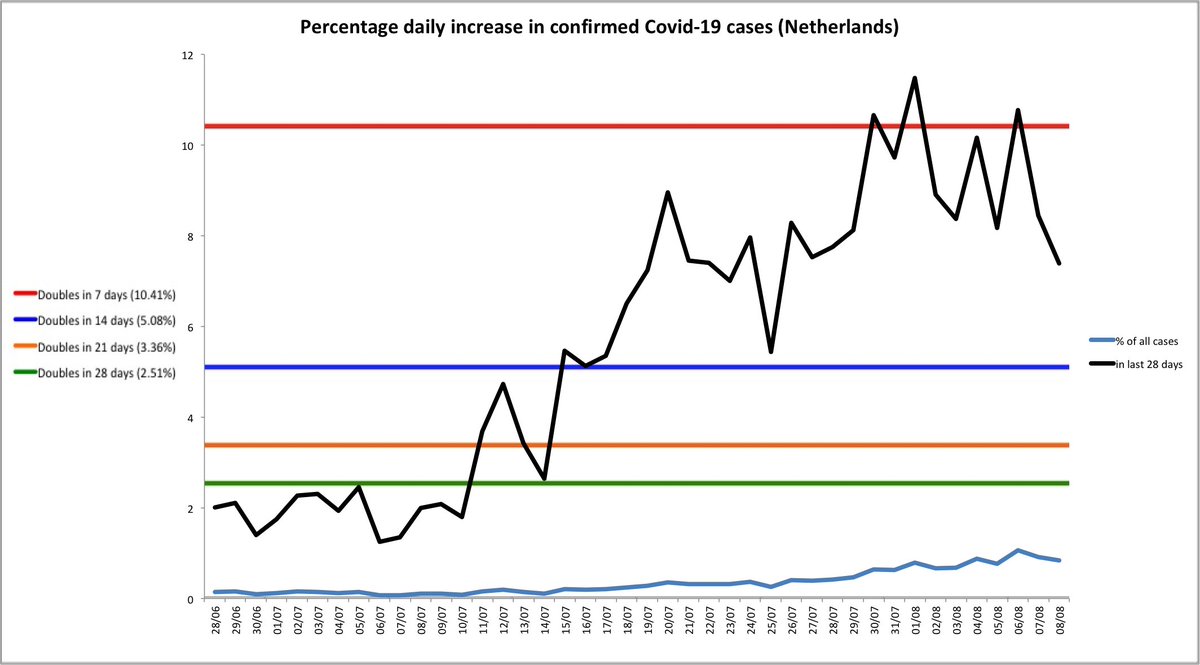Not done one of these for a while. A chart showing how the rate of Covid-19 infections in the Netherlands has increased in the last 6 weeks. Taken as a percentage of cases in the past 28 days it's risen from around 2% in the first week of July to 11.5% on August 1.
The coloured bars represent exponential growth rates. If you're consistently below 2.5% it means new cases are doubling every 4 weeks, which is very manageable. In the last 2 weeks we've been doubling every 7-8 days. These numbers have to come down.
It's not all bad news. The average for the last 7 days (8.9%) is slightly lower than for the last 14 (9.0%), suggesting the rate is levelling off. But daily infections are still rising. If they don't slow down we'll have around 2,500 infections a day by the end of the month.
Also, note how the percentages seemed to be drifting down in the last third of July, only to jump back up again at the start of August. It's too early to talk about a sustained downward trend.
Important to note, at the same time, that this resurgence is very different from the initial outbreak in March. Hospital admissions, intensive care cases and deaths are still low and creeping up slowly, even though infections have been increasing for 3 weeks now.
Most infections are among people aged 20-40, who are less likely to get seriously ill. But obviously, the longer infections rise among the young, the greater the risk of them passing the virus on to more vulnerable groups.
We know more about the virus, how it spreads and how it can be contained than we did at the start. And the positive test rate, though it rose from 1.0% to 2.3% in last week's data, is still way below the 30% levels we had in March, so the official figures are much more accurate.
So the information is there. The question is whether the government will act quickly and effectively. The figures from Barcelona and Antwerp indicate that short local lockdowns – even partial measures like a curfew – are effective at checking the spread.
The evidence on masks is much more ambivalent. It's worrying that masks are so dominant in the public debate when they're one of the least effective and reliable forms of control, and mainly as a supplementary measure to social distancing, screening and lockdowns.
Too many people are engaging in mask bargaining - believing that imposing stricter mask-wearing regulations menas we can open up places sooner and won't need another lockdown. If you reach the point where you need to take drastic steps, the masks alone won't save you.
There are other problems with mandatory mask-wearing. In the Netherlands a fine for breaching the corona regulations earns you a criminal record. And most infections are in settings like family gatherings, where masks can't be enforced without grievous consequences for privacy.
Fines for mask wearing are going to disproportionately hit the most vulnerable in society. People living in heavily policed areas. The poor who can't afford the fines. The physically disabled who struggle to wear them. The mentally disabled who struggle to remember to wear them.
The point of coronavirus restrictions is to protect the most vulnerable. Draconian fines have the opposite effect. Making people criminals for not complying with a rule whose benefits for public health and safety are debatable at best is illiberal and alarming.
Compulsory mask wearing also fails to take account of the vast regional disparity. Why should someone in Emmen, where cases are close to zero, be fined for not wearing a mask in a shop – especially when there are almost no recorded cases of people being infected in shops?
So by all means promote mask wearing, wear one if it makes you feel safer and shout at others for not wearing them if it makes you feel virtuous. Let local authorities enforce them where appropriate. Just be aware that if push comes to shove, the masks won't save you.
Nobody wants to go into lockdown again: it's gruelling. The danger is that by falling into the trap of thinking that the masks can save us from another lockdown, we delay too long and end up locking down longer and harder than we needed to, with all the disruption that entails.

 Read on Twitter
Read on Twitter


